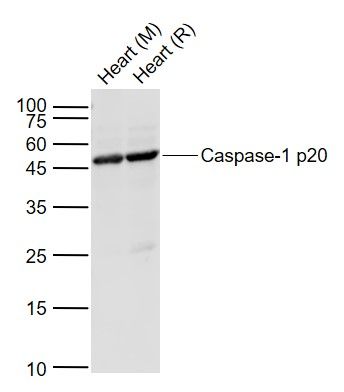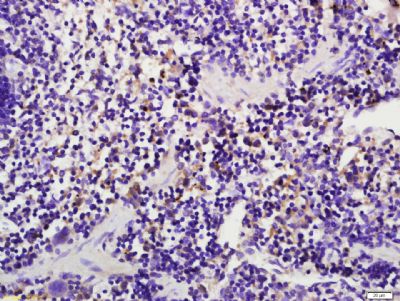Product Name :
Caspase-1 p20 Polyclonal Antibody Background :
This gene encodes a protein which is a member of the cysteine-aspartic acid protease (caspase) family. Sequential activation of caspases plays a central role in the execution-phase of cell apoptosis. Caspases exist as inactive proenzymes which undergo proteolytic processing at conserved aspartic residues to produce 2 subunits, large and small, that dimerize to form the active enzyme. This gene was identified by its ability to proteolytically cleave and activate the inactive precursor of interleukin-1, a cytokine involved in the processes such as inflammation, septic shock, and wound healing. This gene has been shown to induce cell apoptosis and may function in various developmental stages. Studies of a similar gene in mouse suggest a role in the pathogenesis of Huntington disease. Alternative splicing of this gene results in five transcript variants encoding distinct isoforms. [provided by RefSeq]. Product :
0.01M TBS(pH7.4) with 1% BSA, 0.03% Proclin300 and 50% Glycerol. Storage&Stability :
Store at 4°C short term. Aliquot and store at -20°C long term. Avoid freeze-thaw cycles. Specificity :
Caspase-1 p20 Polyclonal Antibody detects endogenous levels of Caspase-1 p20 protein. Immunogen :
KLH conjugated synthetic peptide derived from mouse Caspase-1 p20 Conjugate :
Unconjugated Modification :
Unmodification
Caspase-1 p20 Polyclonal Antibody Background :
This gene encodes a protein which is a member of the cysteine-aspartic acid protease (caspase) family. Sequential activation of caspases plays a central role in the execution-phase of cell apoptosis. Caspases exist as inactive proenzymes which undergo proteolytic processing at conserved aspartic residues to produce 2 subunits, large and small, that dimerize to form the active enzyme. This gene was identified by its ability to proteolytically cleave and activate the inactive precursor of interleukin-1, a cytokine involved in the processes such as inflammation, septic shock, and wound healing. This gene has been shown to induce cell apoptosis and may function in various developmental stages. Studies of a similar gene in mouse suggest a role in the pathogenesis of Huntington disease. Alternative splicing of this gene results in five transcript variants encoding distinct isoforms. [provided by RefSeq]. Product :
0.01M TBS(pH7.4) with 1% BSA, 0.03% Proclin300 and 50% Glycerol. Storage&Stability :
Store at 4°C short term. Aliquot and store at -20°C long term. Avoid freeze-thaw cycles. Specificity :
Caspase-1 p20 Polyclonal Antibody detects endogenous levels of Caspase-1 p20 protein. Immunogen :
KLH conjugated synthetic peptide derived from mouse Caspase-1 p20 Conjugate :
Unconjugated Modification :
Unmodification
-
 Primary: Anti-Caspase-1 p20 at 1/1000 dilution.
Primary: Anti-Caspase-1 p20 at 1/1000 dilution. -
 Tissue/cell: Mouse spleen tissue; 4% Paraformaldehyde-fixed and paraffin-embedded; Antigen retrieval: citrate buffer ( 0.01M, pH 6.0 ), Boiling bathing for 15min; Block endogenous peroxidase by 3% Hydrogen peroxide for 30min; Blocking buffer at 37℃ for 20 min; Incubation: Anti-Caspase-1 p20 Polyclonal Antibody, Unconjugated 1:500, overnight at 4℃.
Tissue/cell: Mouse spleen tissue; 4% Paraformaldehyde-fixed and paraffin-embedded; Antigen retrieval: citrate buffer ( 0.01M, pH 6.0 ), Boiling bathing for 15min; Block endogenous peroxidase by 3% Hydrogen peroxide for 30min; Blocking buffer at 37℃ for 20 min; Incubation: Anti-Caspase-1 p20 Polyclonal Antibody, Unconjugated 1:500, overnight at 4℃.
Chronic dexamethasone treatment results in hippocampal neurons injury due to activate NLRP1 inflammasome in vitro
PMCID: Pubmed No.:28605710
Ketone Metabolite β-Hydroxybutyrate Ameliorates Inflammation After Spinal Cord Injury by Inhibiting the NLRP3 Inflammasome
PMCID: Pubmed No.:33108630
Ketogenic diet ameliorates inflammation by inhibiting the NLRP3 inflammasome in osteoarthritis
PMCID: Pubmed No.:35585627
Bioworld Biotech only provide peptides for our antibodies and do not provide additional peptide customization services.
Price/Size :
USD 368/1mg/vial
Tips:
For phospho antibody, we provide phospho peptide(0.5mg) and non-phospho peptide(0.5mg).Describe :
Blocking peptides are peptides that bind specifically to the target antibody and block antibody binding. These peptide usually contains the epitope recognized by the antibody. Antibodies bound to the blocking peptide no longer bind to the epitope on the target protein. This mechanism is useful when non-specific binding is an issue, for example, in Western blotting (WB) and Immunohistochemistry (IHC). By comparing the staining from the blocked antibody versus the antibody alone, one can see which staining is specific; Specific binding will be absent from the western blot or IHC performed with the neutralized antibody.Formula:
Synthetic peptide was lyophilized with 100% acetonitrile and is supplied as a powder. Reconstitute with 0.1 ml DI water for a final concentration of 10 mg/ml.The purity is >90%,tested by HPLC and MS.
Storage:
The freeze-dried powder is more stable. For short time at 2-8°C. For long term storage store at -20°C.
Note :
This product is for research use only (RUO only). Not for use in diagnostic or therapeutic procedures.
 Caspase-1 p20 Polyclonal Antibody
Caspase-1 p20 Polyclonal Antibody  Datasheet
Datasheet COA
COA MSDS
MSDS SHIP
SHIP